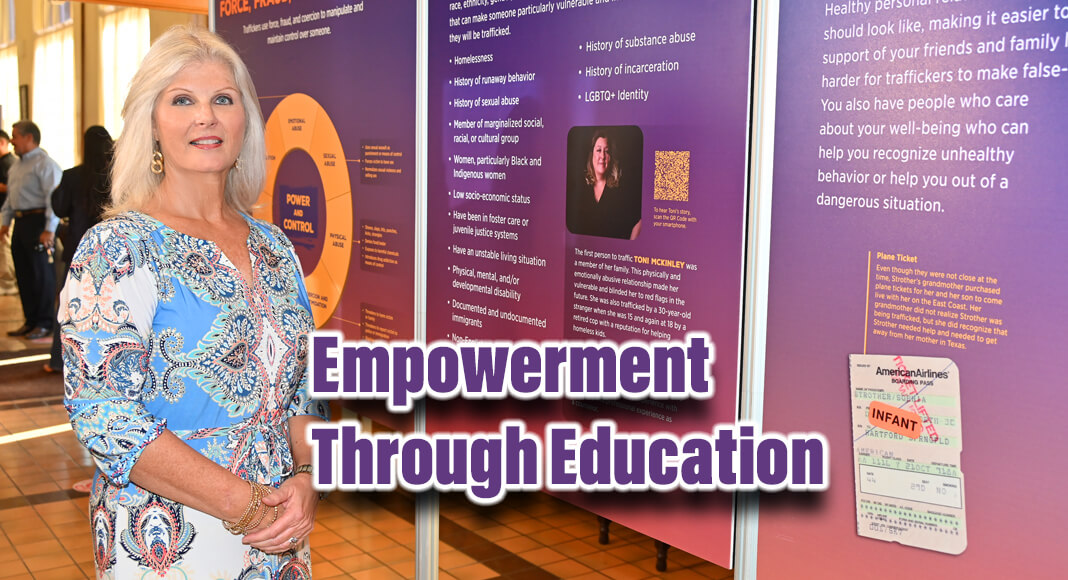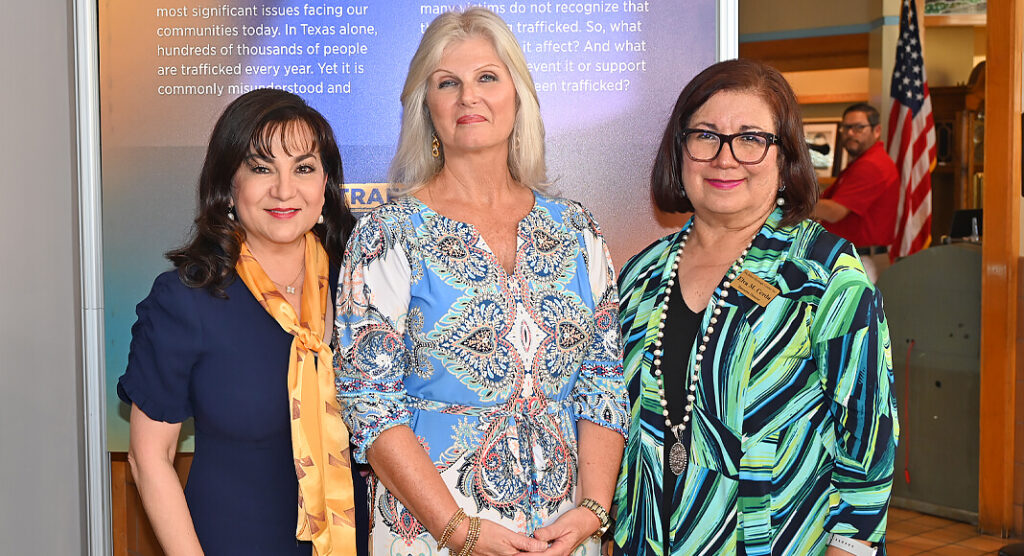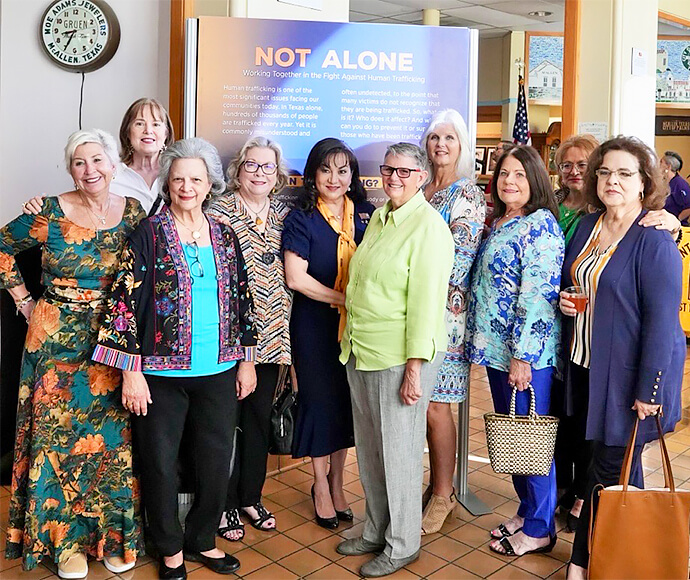
Texas Border Business
By Roberto Hugo González
In a bold endeavor to illuminate one of the most pressing yet often misunderstood crises of our time, the McAllen Heritage Center Museum of History and Culture, in collaboration with the Bullock Texas State History Museum, has launched a remarkable exhibit titled “Not Alone: Working Together in the Fight against Human Trafficking.” Sponsored by the Zonta Club of West Hidalgo County, Annette Franz, its president, and its members, a group of distinguished ladies from the region. This compelling panel exhibit has captivated visitors since its opening on March 6, with plans to run through April 10, 2024.

At its core, the exhibit aims to educate the public about the grim realities of human trafficking—a pervasive issue affecting hundreds of thousands of individuals in Texas alone. By weaving through a series of thought-provoking questions, the exhibit not only demystifies what human trafficking entails but also digs into the human stories behind the statistics. It highlights both the sex and labor trafficking landscapes, revealing who is most at risk, the tactics traffickers use to lure and entrap their victims, and the significant role that social media and healthy relationships can play in either facilitating or spoiling traffickers’ efforts.
Integral to the exhibit’s mission is Tracy Hughes’ voice, the founder of Tamar’s Tapestry, a community-based initiative dedicated to fighting human trafficking. Hughes’ journey began with a quest for knowledge and strategies abroad, transforming into a focused, local effort to address this global issue. Despite challenges, including the closure of a shelter for survivors due to various circumstances, including the COVID-19 pandemic, Tamar’s Tapestry has made strides in victim identification and raising awareness through innovative programs and film projects.
Hughes’ reflection on Tamar’s Tapestry’s impact reveals a sobering reality: the work is far from done. Despite helping many survivors directly, the need for support and intervention remains vast. Hughes and her colleagues face ongoing challenges, such as prosecuting traffickers, balancing victims’ safety with the legal system’s requirements, and implications for policy and legislation.
Through its educational approach and the personal insights from fighters like Hughes, this exhibit serves as hope and a call to action. It emphasizes the importance of community engagement, informed advocacy, and the relentless pursuit of justice and support for survivors. The McAllen Heritage Center Museum of History and Culture and its partners invite visitors to join in this critical fight, emphasizing that no one is alone in the struggle against human trafficking. Through awareness, education, and empowerment, there is hope for a future where such exploitation is eradicated.

The McAllen Heritage Center Museum of History and Culture continues its profound exhibition, “Not Alone”: Working Together in the Fight against Human Trafficking,” shedding light on the complexities and collaborative efforts required to combat this heinous crime. Through its partnership with the Bullock Texas State History Museum and sponsorship from the Zonta Club of West Hidalgo County, it invites the community to join the fight against human trafficking.
Tracy Hughes, a tireless advocate and founder of Tamar’s Tapestry, shares insights into the political and social landscape surrounding human trafficking advocacy. According to Hughes, there exists a commendable unity among Texas lawmakers when it comes to addressing human trafficking. “When I have gone for advocacy day… it’s pretty much an open door,” Hughes states. This bipartisan agreement underlines a universal condemnation of trafficking and a shared commitment to safeguarding the well-being of children and vulnerable populations in Texas. The consensus among representatives and senators transcends political divisions, emphasizing a collective determination to eradicate human trafficking.
Despite the encouraging support from lawmakers, Hughes highlights a daunting challenge: the lack of comprehensive data on the number of children affected by trafficking, exacerbated by issues related to immigration and undocumented individuals. This absence of precise statistics hampers efforts to grasp the full extent of the crisis, underscoring the need for improved mechanisms to track and support victims.
Funding and sustaining organizations like Tamar’s Tapestry pose additional hurdles. Initially reliant on private donations, the organization faced setbacks due to the COVID-19 pandemic and Hughes’s challenges. Yet, the organization’s spirit of resilience and dedication to the cause remains unbroken. Hughes emphasizes the crucial role of community vigilance and the importance of reporting suspicious activities. “If you see something, say something,” she urges, highlighting how community tips have been instrumental in identifying and rescuing victims of human trafficking.
This call to action is not just for the South Texas community but for every individual who witnesses potential signs of trafficking. Thanks to the vigilance of concerned citizens, the National Human Trafficking Hotline has proven to be a vital resource. Hughes’s message is clear: awareness, education, and community engagement are crucial to combating human trafficking. By fostering an environment where every suspicion is taken seriously and every potential victim is given a chance for rescue, the community can significantly contribute to the fight against this global epidemic.
The McAllen Heritage Center Museum of History and Culture exhibition is more than just an educational experience; it is a rallying cry for action. Through the collaborative efforts of advocates, lawmakers, and the community, there is hope for a future where the menace of human trafficking is finally eradicated. As Hughes and her colleagues continue to navigate the complexities of advocacy and support for survivors, their commitment is the power of unity in the face of adversity.
Amplifying Survivor Stories Through Film
The McAllen Heritage Center Museum of History and Culture, alongside the ongoing exhibit “Not Alone: Working Together in the Fight against Human Trafficking,” introduces the public to another powerful medium of awareness and education spearheaded by Tracy Hughes and her organization, Tamar’s Tapestry. The filmmaking journey reflects a deep commitment to shedding light on the dark world of human trafficking through the stories of those who have lived it.
“Surviving Sex Trafficking,” a documentary meticulously crafted, ventures into the heart-wrenching experiences of survivors. Initially envisioned to include interviews with child survivors from around the globe, the project’s scope was refined to focus on the narratives of four women, offering a moving look into their journeys of escape and recovery. This film, honored with an Academy Award nomination in 2022, is proof of the survivors’ courage and the filmmakers’ dedication to bringing these crucial stories to the forefront of public consciousness. Available on platforms like Stars, Prime, and YouTube, it extends the reach of its vital message far beyond the walls of the McAllen Heritage Center.
The success of “Surviving Sex Trafficking” builds on the foundation laid by “Stopping Traffic,” the first film produced by Hughes’s organization, which aimed to educate the public on the basics of human trafficking. The sequel, enriched by survivor perspectives and insights into the challenges shelters face, accentuates the complex realities of rehabilitation and the relentless efforts needed to support survivors in reintegration into society.
While the possibility of a third film remains uncertain, the impact of these documentaries continues to resonate. They not only highlight the critical need for awareness and education but also emphasize the importance of recognizing the signs of trafficking and the appropriate actions to take when suspicions arise. Hughes cautions against direct intervention by untrained individuals, stressing the potential dangers for the victim and the would-be rescuer. Instead, she advocates for informed vigilance and reliance on professional authorities to ensure the safety and well-being of trafficking survivors.
In her mission to combat human trafficking, Hughes also leverages social media platforms like Facebook to disseminate information and engage with the community. Although Tamar’s Tapestry operates with a degree of discretion due to the sensitive nature of its work, its online presence serves as a valuable resource for education and advocacy.
The McAllen Heritage Center Museum of History and Culture, through its collaboration with Tracy Hughes and the Zonta Club of West Hidalgo County, reaffirms its commitment to not only educating the public about the scourge of human trafficking but also empowering individuals with the knowledge to make a difference. Through exhibitions, films, and community engagement, the fight against human trafficking gains strength, grounded in the belief that awareness, compassion, and action can pave the way to a world where exploitation has no place.
McAllen Heritage Center, 301 S. Main St., La Plazita Park, southside of MHC. Limited free parking is available in the rear of the building.















